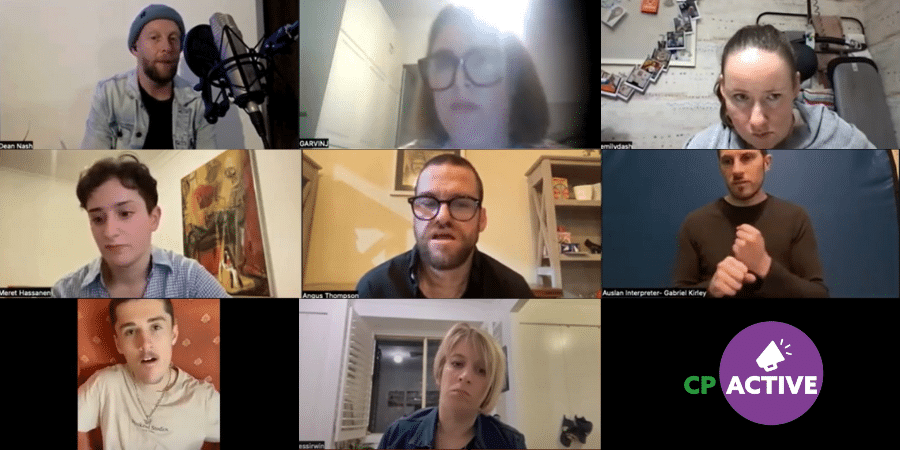
Post-event summary
“Lift each other up”: Creators with disability take the limelight in CPActive Town Hall
The CPActive community came together last week for a webinar with a difference – a transformational session dedicated to strengthening community through storytelling, led by artists with cerebral palsy.
Nearly 100 people with lived experience of CP, their family members and allies joined the ‘Stories that Activate’ event, a new type of virtual town hall featuring art, music, film, storytelling and more.
The webinar aimed to create a common space for artists with CP to share their experiences and discuss their journeys as artists and activists.
First up, attendees heard from comedian Angus Thompson, who discussed his award-winning SBS TV series, ‘Latecomers’, the first Australian show to feature two lead actors with CP.
“All my stories try and tell the truth through my own life and what’s important to me… I want to tell the Australian public about what I’m going through as a man with cerebral palsy,” he said.
Host Johanna Garvin, a CPA board member and successful filmmaker, then had insightful discussions about the creative and collaborative process with musician Dean Nash, and producer and writer Meret Hassanen and actor Emily Dash.
Registrations are now open for our next Town Hall event in September 2024.
Jess Irwin, a non-verbal photographer and visual artist, showcased her creative process, while the webinar also showcased the music of DJ Cooper and featured artworks by Will Flanagan, an emerging visual artist with CP from Sydney.
Finally, all the guests came together to take audience questions and discuss their common experiences in a wide-ranging panel session expertly managed by moderator Jo Garvin.
The panellists agreed that finding a supporting community was a crucial element in creating powerful art: “it’s really great to connect with community and draw from community and find your real place and what you can offer and how you can also lift each other up,” said Dash.
A key theme was the need to create more spaces and opportunities for storytelling where disability was just a part of a person’s identity, rather than the centrepiece of the art.
“Make people uncomfortable, make people question their views… I just think that making disability mainstream by not narrowing or confining artists with disability to telling stories specifically about disability would be the ultimate goal,” said Meret.
If you are having trouble viewing the above video in your browser, please click here to watch it on YouTube instead.